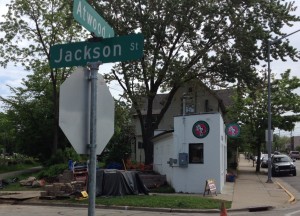‘Placemaking’ plan in WI could lead to government cronyism, experts say

By Adam Tobias | Wisconsin Reporter
MADISON, Wis. — A Madison council member is considering shutting down a block of Jackson Street for the summer to give a boost to the Chocolate Shoppe ice cream parlor’s new location on Atwood Avenue.
SHUT IT DOWN: The city of Madison is considering closing down a public street to turn an ice cream business into a gathering place, a move some say could lead to government cronyism.
Alderwoman Marsha Rummel calls it “placemaking,” a nascent national movement designating public spaces to encourage community gatherings.
Some economists and government watchdogs view it as a form of cronyism, politicians commandeering public property to promote select private businesses.
“The government’s obligation or duty is to create a level playing field so that everybody has the same opportunity,” Orville Seymer, field coordinator for Citizens for Responsible Government in Milwaukee, told Wisconsin Reporter. “The free market should decide who should win and who should lose, not government.”
A public meeting to discuss blocking Jackson Street from Atwood Avenue to St. Paul Avenue is scheduled at 7 p.m. Thursday in the basement of the Plymouth Congregational Church of Christ, 2401 Atwood Ave.
Certain to be part of that public discussion is the fate of a popular bicycle path crossing on that block.
Rummel told Wisconsin Reporter she made the proposal to help a business district and create intimate relationships between neighbors. She envisions the area also being used by musicians and food cart operators.
“It brings people together and that maybe spins off other energy and that’s a positive thing,” Rummel said.
But Byron Schlomach, director of the Center for Economic Prosperity at the Arizona-based Goldwater Institute, thinks, if approved, the city will open the door to other requests from businesses for favorable treatment.
Public streets, he said, should be closed only to improve public health and safety.
“It is a dangerous precedent and it will lead to even worse precedents,” Schlomach told Wisconsin Reporter. “To have a road shut down, to have them reroute it completely, to reconfigure them in a way that’s unique and not traditional, all those things are going to start being requested and where do you say no? Where to you draw the line?”
Rummel said she never thought about other businesses being treated unfairly when she put the proposal together. She doesn’t foresee the floodgates opening for these requests because she says what she’s asking for is only temporary — at least for now.
Council members would have to approve any permanent change.
Closing a public street will inconvenience motorists and could cause more littering and noise pollution in the neighborhood, said William Dunkelberg, chief economist for the National Federation of Independent Business.
“It sounds like a bad idea,” he added.
Bad, perhaps, but legally defensible, according to Rick Esenberg, president and general counsel of the Wisconsin Institute for Law and Liberty.
“As long as (the city) can come up with a rational reason of why we thought it was a good idea to do it here and we didn’t think it was a good idea to do it there, they are not going to have any particular type of legal problem,” Esenberg said.
Contact Adam Tobias at atobias@watchdog.org or follow him on Twitter @Scoop_Tobias







